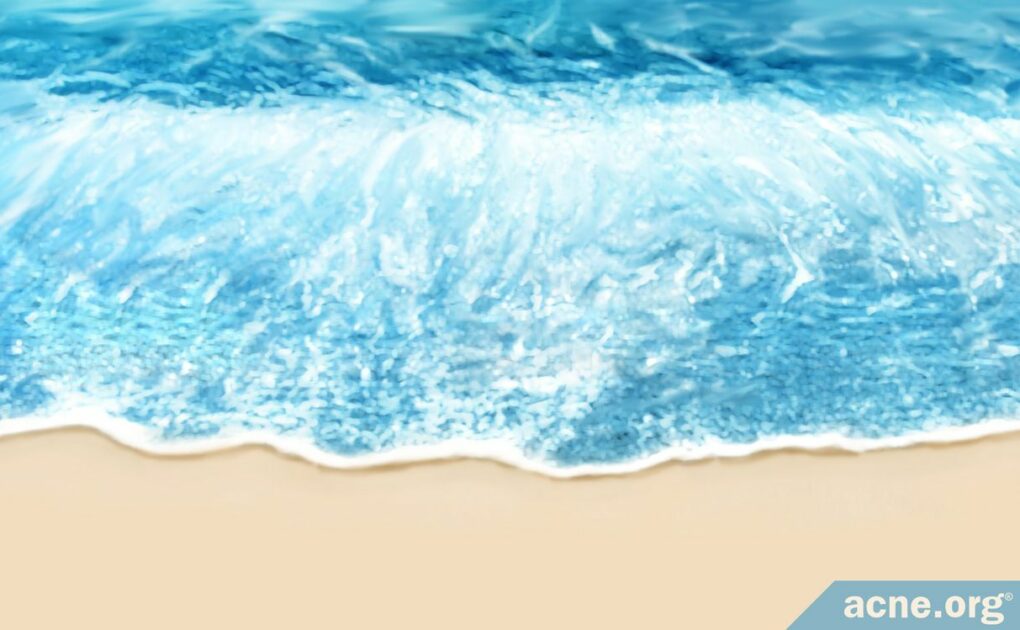It Won’t Hurt and Just Might Help

The Essential Info
There is no evidence that seawater can negatively affect any skin disease, including acne. If you are acne-prone, you can safely swim in the sea.
However, take the following precautions:
- When drying off, very gently pat your skin dry to avoid physically irritating the skin.
- Try to time swimming activities so you can perform your morning or evening anti-acne regimen after you swim.
- Protect your skin from too much sun exposure using non-pore-clogging sunscreens.
It is also safe to swim in a pool, but because of the potentially beneficial effects of dissolved mineral salts in seawater, when given a choice, choose swimming in the ocean/sea over swimming in a pool.

The Science
- Effects of Seawater on Acne and Other Skin Conditions
- Beneficial Effects of Minerals Found in the Dead Sea
- Studies That Use Dead Sea Water for Acne
- Studies That Use Dead Sea Salt for Psoriasis
- How Dead Sea Salts May Improve Skin Barrier Function
- Takeaway from These Studies
- TIP!
- Sun Exposure
Over all the years of dermatological studies, we have seen no evidence that seawater is bad for the skin. But is swimming in seawater good for the skin?
This is hard to say for sure since there are no direct studies specifically on seawater and acne, but we do have studies on how Dead Sea water might potentially improve acne and other skin issues. Seawater contains 3.5% of dissolved mineral salts. The Dead Sea contains 34% of similar dissolved mineral salts.
There is one weak study that shows that Dead Sea salts might be therapeutic for acne, and there are stronger studies that point toward the positive effects of Dead Sea salts on psoriasis and on the skin’s barrier function. Taken together, the preponderance of the evidence at this point shows us that swimming in the ocean/sea is not bad for acne, and might actually help a bit.
Expand to learn about the composition of seawater
The most abundant compounds in seawater are inorganic (mineral) salts, such as sodium chloride and calcium carbonate.
On average, seawater contains about 3.5% of dissolved inorganic salts. This means one gallon of seawater contains about 4.5 ounces of salts.
To be specific, when salts are dissolved in water, their components separate into ions, so it is more accurate to describe the concentration of ions in seawater rather than their parent salts. Here is a list of the most common ions found in seawater and their chemical abbreviations:
- Chloride Cl-
- Sodium Na+
- Sulfate SO4–
- Magnesium Mg++
- Calcium Ca++
- Potassium K+
- Bicarbonate HCO3-
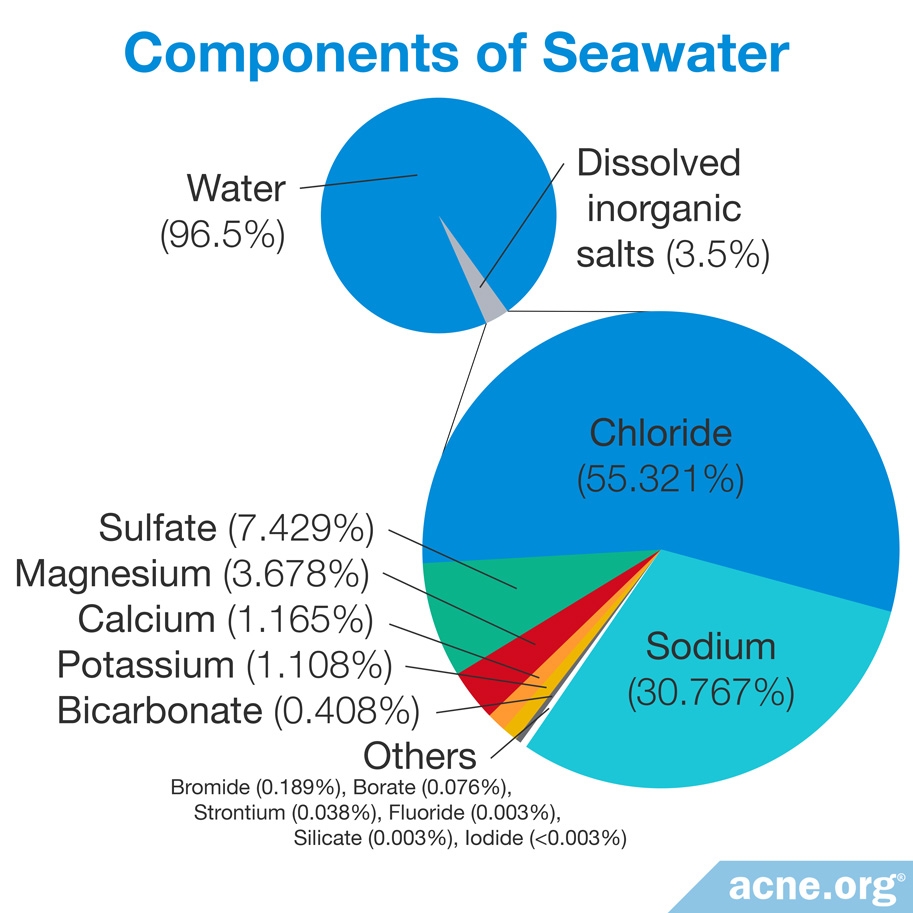
Another way to describe the amount of salts in seawater is salinity. For average seawater that contains about 3.5% salt, which includes most oceans and seas, the salinity is said to be 35. However, there is some variation. The Red Sea is the most salty sea with a salinity of 40, while the lowest salinity is found in northern areas of the Baltic Sea, around 5. The Dead Sea, which is actually a large saltwater lake, is much saltier than oceans and seas, with a salinity of 320.1
Seawater also contains organic compounds in trace amounts. These appear in the seawater from the decomposition of animals and plants or from secretion by living organisms. These compounds are the same as typically found in living cells and include proteins, sugars, and lipids (oils and fats).2 Vitamins B1, B2, B6, B7, and B12 exist in seawater at extremely low concentrations, just a few molecules per trillion (1,000,000,000,000).3 Organic molecules are at such low concentrations that it is safe to ignore them when considering the effects of seawater.
Effects of Seawater on Acne and Other Skin Conditions
Our own bodies are slightly salty, containing about 0.9% sodium chloride (salt). Because of this, medical professionals use a saline solution of the same concentration, not fresh water, for infusions and to flush wounds.
Considering that doctors use low-concentration salt water to treat wounds, and, officially speaking, acne lesions are wounds, it makes common sense that the slightly higher salinity in seawater should at the very least not harm acne-prone skin or worsen the symptoms.
To add to this, bathing in mineral-rich water, such as in the Dead Sea, has been a tradition since antiquity, and there are studies on the beneficial effect of Dead Sea salts on skin conditions such as psoriasis. Furthermore, as I have mentioned, there are studies showing that Dead Sea salts can improve the skin’s barrier function.4 This is important since people with acne tend to have an impaired barrier function. These studies may give us clues to the potentially beneficial effects of typical seawater. Let’s have a look at the beneficial effects of minerals found in the Dead Sea.
Beneficial Effects of Minerals Found in the Dead Sea
The Dead Sea is the richest natural mineral source in the world, containing 34% dissolved minerals. It also contains a higher percentage of beneficial minerals when compared with other seawater around the world.
Expand to learn about the composition of the Dead Sea
The composition is a bit different from that of seawater. The most common ions are:
- Chloride Cl-
- Magnesium Mg++
- Sodium Na+
- Calcium Ca++
- Potassium K+
- Bromide Br+4
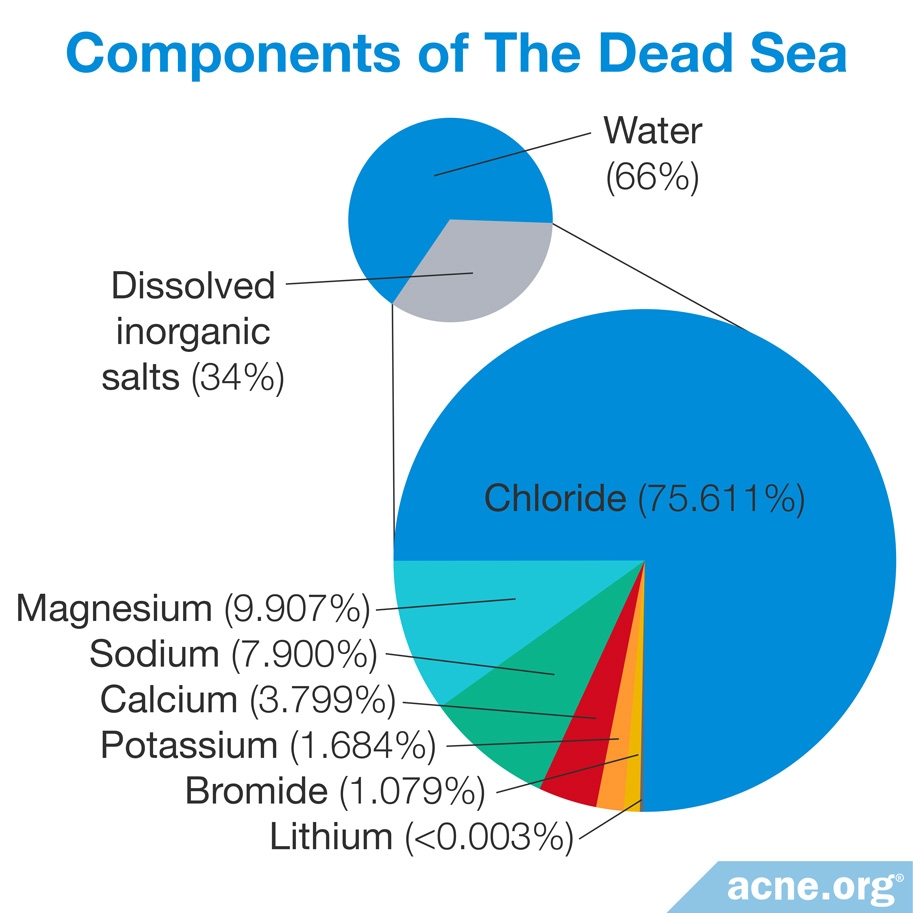
Notice that magnesium is the second-most abundant ion in the Dead Sea, whereas it is the fourth-most abundant ion in seawater. The concentration of calcium is also higher in the Dead Sea than in seawater. When it comes to acne, this is important because magnesium and calcium help regulate the production of skin cells. In acne, when skin cells are overproduced, this can lead to clogged pores, so regulating skin cell production is important to prevent clogged pores. In other words, the composition of the Dead Sea may have special benefits above that of seawater.
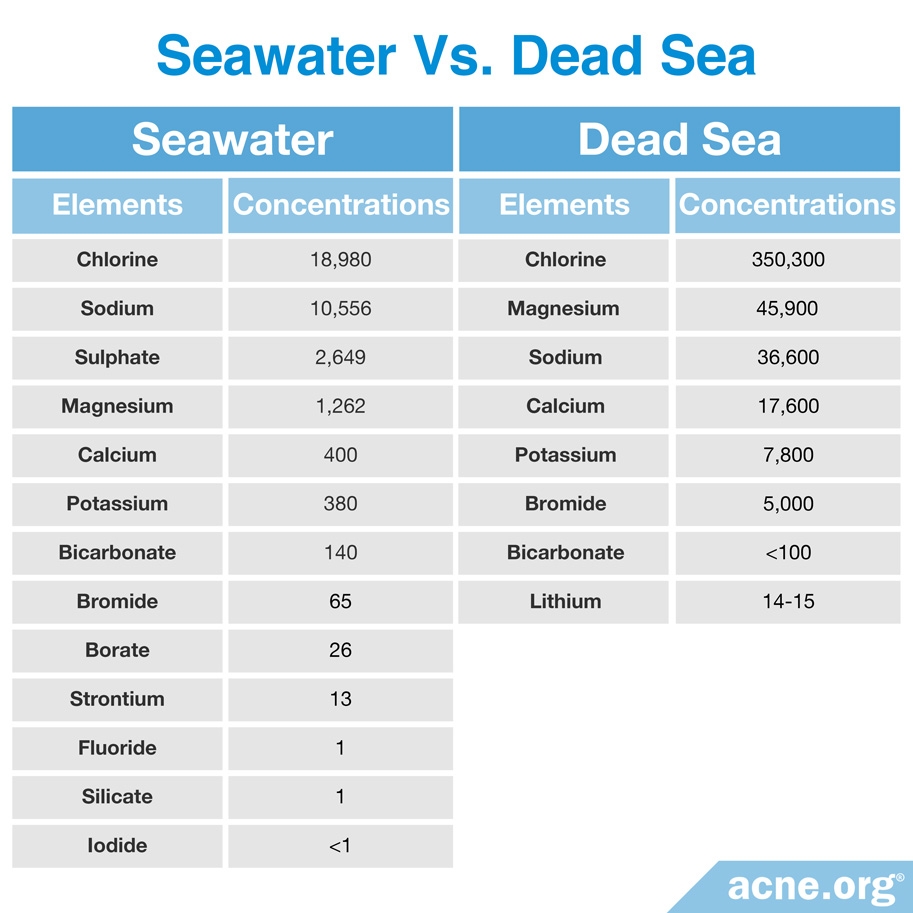
Magnesium and calcium also improve the function of the skin barrier, which is the name dermatologists give to the very outermost layer of skin, called the stratum corneum. It is the stratum corneum that protects us from the environment, both environmental irritants as well as microorganisms. It also keeps water inside deeper layers of skin, helping to maintain healthy and balanced skin overall. The skin barrier is particularly important to acne because people who have acne tend to have an impaired skin barrier. Anything that improves its function might be beneficial for acne.5,6
Calcium ions also play a major role in the process of healing wounds. Since acne lesions are classified as wounds, the calcium ions found in seawater may be helpful for healing existing acne.
Also, the ions of magnesium reduce the harmful effects of ultraviolet (UV) radiation from the sun.5 This helps to prevent sunburn. Since sunburn can lead to acne symptoms in the weeks following the sunburn, anything that helps prevent sunburn is also potentially beneficial to acne.
Let’s have a closer look at studies on how the admittedly much more concentrated and potentially more beneficial Dead Sea water might help with acne and likely helps with other skin diseases. As you read, remember that regular seawater is only about 1/10 as concentrated and may contain less of the beneficial minerals. However, if the Dead Sea helps, it is safe to assume that regular seawater may confer at least some degree of benefit as well.
Studies That Use Dead Sea Water for Acne

Only one, relatively weak study has specifically reported on how the Dead Sea could affect acne. The authors stated, “[A]ll 86 patients treated for acne at the Dead Sea between 1992 and 1995 demonstrated a significant improvement, with a reduced number of comedones (clogged pores) and pustules (pimples).”7 The authors did not give statistics or mention controls, so results should be interpreted with caution.
Not overly impressed with that study? Me neither. However, studies on the beneficial effects of Dead Sea water on psoriasis and the skin barrier may help underline the benefits of seawater for acne patients. We’ll look at those next.
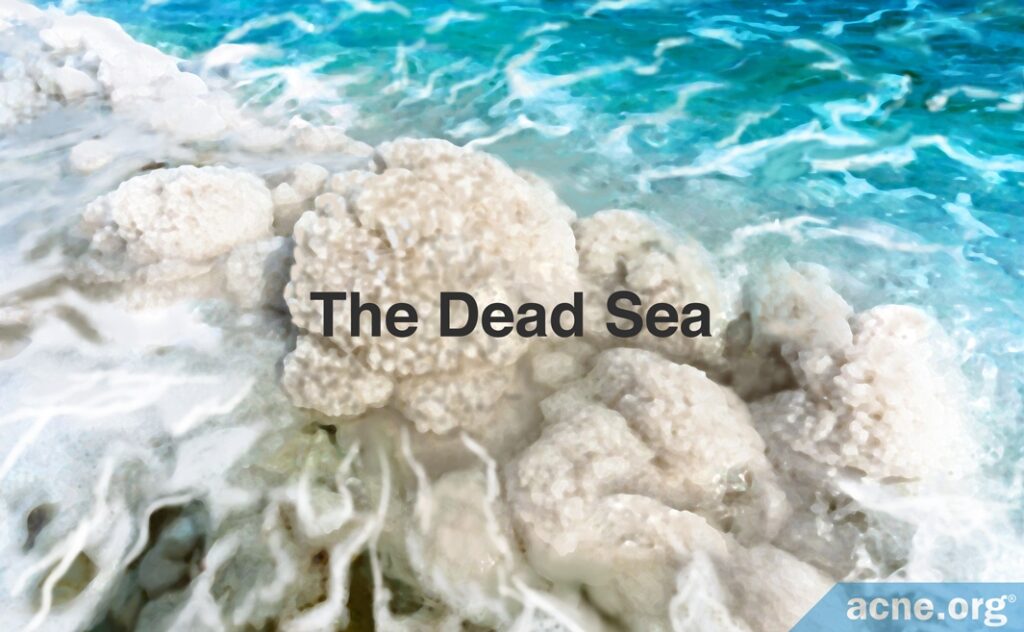
Studies That Use Dead Sea Salt for Psoriasis
Acne and psoriasis both are skin diseases that include as part of their development the overgrowth of skin cells. For this reason, the studies on psoriasis may help us to understand how seawater might affect acne.
Psoriasis typically includes symptoms of red, itchy, and scaly skin. Treatment at the Dead Sea is recommended for this condition because of the combination of Dead Sea water and sun exposure on its shores. However, keep in mind that while there are some similarities between psoriasis and acne, treating acne with sun exposure is unlikely to produce the same benefits as it does with psoriasis.
One study published in 1997 found that bathing in Dead Sea salt water reduced psoriasis symptoms, suggesting that it’s possible that swimming or bathing in seawater might be helpful for acne as well.8
Expand to read details of study

In 1997, a team of researchers compared the effects of a Dead Sea salt solution to those of a simple sodium chloride solution on 30 patients (19 men and 11 women) who had psoriasis. The patients were divided into two groups. Group I bathed in a solution of salts from the Dead Sea, and group II bathed in a solution of sodium chloride (regular table salt). The patients bathed for 20 minutes every day for three weeks. The results are shown below:
- Group 1 (Dead Sea salts) – 34.8% reduction in psoriasis symptoms
- Group 2 (Simple salt solution) – 27.5% reduction in psoriasis symptoms
The results show that bathing in a solution of Dead Sea salts and bathing in a solution of table salt are both effective for psoriasis. However, bathing in Dead Sea salts show slightly better results. Since acne and psoriasis display some similarities, swimming/bathing in seawater might help with acne as well.8
A different study published in 2008 looked at the combination of bathing in Dead Sea water and sunbathing on the shores of the Dead Sea as a treatment for psoriasis.9 While the treatment significantly reduced psoriasis symptoms, it is important to note that excessive sun exposure might not be beneficial for acne and might actually trigger acne symptoms.
Expand to read details of study

In 2008, a different team investigated the combination of bathing in the Dead Sea and basking in the sun on the shores of the Dead Sea as a treatment for psoriasis. The treatment lasted for two weeks and included 85 adults (47 men and 38 women) aged 22 – 80 years. The treatment reduced psoriasis by 77.7% for women and 65.2% for men, for an average reduction of 70.9%.9 If considering this treatment, people with acne should realize that sun exposure might not be beneficial for acne since sunburn and excess sun exposure can lead to acne symptoms as the skin heals itself. Acne patients should consider the benefits of seawater only when comparing these studies.
Studies Showing How Dead Sea Salts May Improve Skin Barrier Function
While evidence is mixed, people with acne may tend to have an impaired skin barrier. Studies show that Dead Sea water may help improve skin barrier function. Anything that improves the skin barrier may help improve acne.
Two studies have found that salt water from the Dead Sea, when used for washing the skin or when incorporated into a topical cosmetic gel, improves skin barrier function.4,10 In addition, one study found that Dead Sea water can strengthen the skin barrier and reduce inflammation in skin cells grown in the lab.11
Expand to read details of studies

In a study published in the International Journal of Dermatology in 2005, researchers investigated the effects of a Dead Sea salt solution on barrier function, hydration, skin roughness, and skin redness in patients with atopic dry skin (irritated, dry skin). Thirty patients (18 males and 12 females) ranging in age from 20 – 54 years participated in the 6-week study. The subjects had atopic dry skin on the forearms and no other skin diseases. The subjects immersed one forearm in a solution of 15% Dead Sea salts. The other forearm was used as a control, immersed only in tap water. Researchers measured water-loss through the skin, skin hydration, skin roughness, and skin redness before and after treatment. After the 6-week treatment, barrier function improved by an average of 19%. Skin hydration increased by about 14% on the forearm treated with the solution of Dead Sea salts and decreased only slightly on the forearm treated with tap water. Skin roughness and redness also decreased.10 The study shows that a solution made with salts of the Dead Sea is more effective than tap water for treating skin conditions that involve a weakened skin barrier.
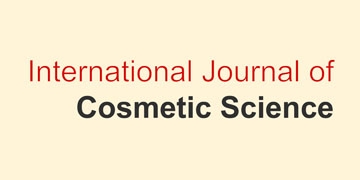
A different study performed in 1997 and published in the International Journal of Cosmetic Science also showed that Dead Sea salts improve skin barrier function. In this study, researchers investigated three types of cosmetic gels on 20 healthy female volunteers:
1. The control version of the gel (no active ingredients added)
2. A formulation containing the control gel with anti-wrinkle ingredients
3. A formulation containing the control gel with 1% of concentrated Dead Sea water
Treatments were performed twice daily over a period of two weeks and researchers evaluated skin roughness before and after the treatment. The control gel decreased skin roughness by 10.4% while the anti-wrinkle gel decreased skin roughness by 27.8%. The gel containing Dead Sea water proved to be superior, decreasing skin roughness by 40.7%.4

A study published in the journal Experimental Dermatology in 2019 also looked at how Dead Sea water affects skin barrier function. The researchers tested Dead Sea water on human skin tissue grown in the lab. The scientists found that applying Dead Sea water to the skin cells stimulated the cells to produce proteins that strengthen the skin barrier.
In addition, the researchers created skin irritation by applying irritating chemicals to the skin tissue, and then applied Dead Sea water to see whether it would help with the irritation. They found that Dead Sea water reduced skin irritation and skin inflammation. Since skin irritation and inflammation are common in acne, this suggests that Dead Sea water might theoretically help with acne.11
Takeaway from These Studies
While there is only one weak study on the beneficial effects of seawater on acne-prone skin, the studies showing that Dead Sea water may improve psoriasis and skin barrier function indicate that regular seawater, which is similar to water from the Dead Sea, albeit at much lower concentration, may also offer beneficial effects, but likely to a lesser degree than water from the Dead Sea.
Seawater Itself Does Not Cause any Skin Diseases
In 2010, researchers published in the International Journal of Dermatology a comprehensive review of skin diseases caused by bathing in the sea:

Contact with organisms that live in the sea, not the seawater itself, caused the vast majority of skin conditions they investigated. The authors mentioned that to date no study has described a detrimental effect of seawater itself on the human skin. Swimming in the sea not only is harmless but may impart mild therapeutic effects on skin diseases such as psoriasis, atopic dermatitis, and perhaps acne.12
TIP: Perform Your Anti-Acne Regimen After Swimming When You Can
Over-washing the skin is one of the most irritating things you can do to your skin. For people with acne, it’s important to wash no more than twice per day. Getting your skin wet in the ocean/sea, or getting it wet in any other way for that matter, is tantamount to washing the skin. So, whenever possible, try to time your swimming activities so that you can perform your anti-acne regimen after swimming.
Stay gentle with your towel: Roughly drying with a towel is a common form of physical irritation, and physical irritation of the skin can aggravate acne, so gently pat dry when you get out of the ocean/sea.
Sun Exposure
When swimming in the ocean/sea, you are often exposing your skin to the UV rays of the sun. Sunlight is not all bad. It promotes the synthesis of vitamin D in our bodies, which is beneficial to skin health, and may be beneficial for acne. On the other hand, over-exposure to the sun can damage the skin and bite back with acne in the weeks following exposure. A little bit of sun is ok, but make sure to avoid sunburn.
Important: When choosing a sunscreen, make sure you choose a “broad-spectrum” and “non-comedogenic” option. Look for terms like “for sensitive skin” or “for acne-prone skin” when you can find it. And when applying sunscreen, like with any other topical skin care product, use your bare hands and stay gentle in application to avoid physically irritating your skin.
References
- Anthoni, J. F. The chemical composition of seawater (2006) www.seafriends.org.nz/oceano/seawater.htm
- Sovga, E. E. & Zhorov, V. A. Analysis of the basic classes of organic compounds dissolved in seawater and their behaviour in the estuaries of rivers and coastal zone of the sea. Physical Oceanography 10, 161 – 167 (1999). https://link.springer.com/article/10.1007/BF02512985
- Heal, K. R. et al. Determination of four forms of vitamin B12 and other B vitamins in seawater by liquid chromatography/tandem mass spectrometry. Rapid Commun. Mass Spectrom. 28, 2398 – 2404 (2014). https://www.ncbi.nlm.nih.gov/pubmed/25303468
- Ma’or, Z., Yehuda, S. & Voss, W. Skin smoothing effects of Dead Sea minerals: comparative profilometric evaluation of skin surface. Int. J. Cosmet. Sci. 19, 105 – 110 (1997). https://www.ncbi.nlm.nih.gov/pubmed/18507637
- Polefka, T. G., Bianchini, R. J. & Shapiro, S. Interaction of mineral salts with the skin: a literature survey. Int. J. Cosmet. Sci. 34, 416 – 423 (2012). https://www.ncbi.nlm.nih.gov/pubmed/22712689
- Halevy, S. & Sukenik, S. Different modalities of spa therapy for skin diseases at the Dead Sea area. Arch. Dermatol. 134, 1416 – 1420 (1998). https://www.ncbi.nlm.nih.gov/pubmed/9828878
- Shani, J. et al. Indications, contraindications and possible side-effects of climatotherapy at the Dead-Sea. Int. J. Dermatol. 36, 481 – 492 (1997). https://www.ncbi.nlm.nih.gov/pubmed/9268742
- Halevy, S., Giryes, H., Friger, M. & Sukenik, S. Dead sea bath salt for the treatment of psoriasis vulgaris: a double-blind controlled study. J. Eur. Acad. Dermatol. Venereol. 9, 237 – 242 (1997). https://onlinelibrary.wiley.com/doi/abs/10.1111/j.1468-3083.1997.tb00509.x
- Cohen, A. D. et al. Outcome of “short-term” Dead Sea climatotherapy for psoriasis. Acta Derm. Venereol. 88, 90 – 91 (2008). https://pdfs.semanticscholar.org/0fb1/0e70d79a193e1533b770bcb43dea285dc0bd.pdf
- Proksch, E., Nissen, H. P., Bremgartner, M. & Urquhart, C. Bathing in a magnesium-rich Dead Sea salt solution improves skin barrier function, enhances skin hydration, and reduces inflammation in atopic dry skin. Int. J. Dermatol. 44, 151 – 157 (2005). https://www.ncbi.nlm.nih.gov/pubmed/15689218
- Portugal‐Cohen, M., Cohen, D., Ish‐Shalom, E., Laor‐Costa, Y. & Ma’or, Z. Dead Sea minerals: New findings on skin and the biology beyond. Exp Dermatol. 28, 585‐592 (2019). https://www.ncbi.nlm.nih.gov/pubmed/30903724
- Tlougan, B. E., Podjasek, J. O. & Adams, B. B. Aquatic sports dematoses. Part 2 – in the water: saltwater dermatoses. Int. J. Dermatol. 49, 994 – 1002 (2010). https://www.ncbi.nlm.nih.gov/pubmed/20883263
